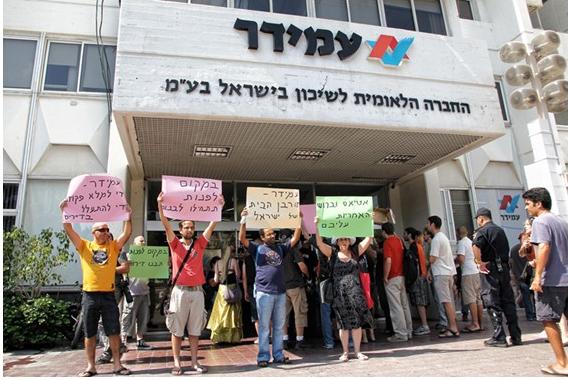The State Comptroller’s Report on Tuesday, May 5, blasted the Construction Ministry for failing to provide public housing to the eligible population and the exorbitant wait times such people have had to endure. Only 39% of those eligible for public housing got their homes within a year, while 32% had to wait over three years. An unfortunate 10% didn’t have their housing after seven years of waiting, and few had waited as long as 15 years.

A demonstration in Tel-Aviv for public housing in front of the offices of Amidar, a state-owned housing company (Photo: Al Ittihad)
In light of the inflated housing market, the findings struck a particularly raw nerve. The Construction Ministry agreed that there is a shortage in public housing stock, but said that the fault was “not in the ministry’s work plan, but the budgetary resources” needed to finance new units. The comptroller noted that in 2013 just 2,570 family units were eligible to receive public housing via the Construction Ministry budget, while the remaining 27,000 family units who received such housing did so from the budget of the Absorption Ministry.
MK Dov Khenin from the Joint List’s Hadash faction said the report was not surprising, and called for a systematic overhaul to the public housing market. “The situation must change immediately by significantly increasing the number of apartments in public housing. Adding a few hundred lone units each year will not work when the shortage is so many thousands of apartments,” he said.
Another section of the report noted that the Economy Ministry was failing to deal with labor violations – particularly against low-wage workers – in a timely fashion, and failing to sniff out other violations on its own. Some 30% of the complaints took over a year to address, according to the report.
Despite two previous reports looking at the issue, the Economy Ministry had failed to update its methods, including upgrading computers and enhancing its scheme for identifying unreported labor violations. Some communities, the report noted, suffered more from the lack of enforcements, such as Palestinian-Arabs in Israel who were less likely to file complaints.


